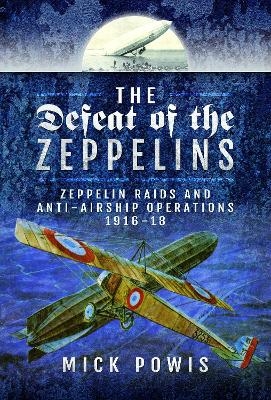
The Defeat of the Zeppelins
Zeppelin Raids and Anti-Airship Operations 1916-18
Seiten
2018
Pen & Sword Aviation (Verlag)
978-1-5267-0249-4 (ISBN)
Pen & Sword Aviation (Verlag)
978-1-5267-0249-4 (ISBN)
Explains the novel use of the Zeppelins for reconnaissance and long-range strategic bombing of Britain as a terror weapon.
Mick Powis describes the novel threat posed to the British war effort by the raids of German airships, or Zeppelins, and the struggle to develop effective defences against them. Despite their size and relatively slow speed, the Zeppelins were hard to locate and destroy at first. They could fly higher than existing fighters and the early raids benefited from a lack of coordination between British services. The development of radio, better aircraft, incendiary ammunition, and, above all, a more coordinated defensive policy, gradually allowed the British to inflict heavy losses on the Zeppelins. The innovative use of seaplanes and planes launched from aircraft carriers allowed the Zeppelins to be intercepted before they reached Britain and to strike back with raids on the Zeppelin sheds. July 1918 saw the RAF and Royal Navy cooperate to destroy two Zeppelins in their base at Tondern (the first attack by aircraft launched from a carrier deck). The last Zeppelin raid on England came in August 1918 and resulted in the destruction of Zeppelin L70 and the death of Peter Strasser, Commander of the Imperial German Navy s Zeppelin force.
Mick Powis describes the novel threat posed to the British war effort by the raids of German airships, or Zeppelins, and the struggle to develop effective defences against them. Despite their size and relatively slow speed, the Zeppelins were hard to locate and destroy at first. They could fly higher than existing fighters and the early raids benefited from a lack of coordination between British services. The development of radio, better aircraft, incendiary ammunition, and, above all, a more coordinated defensive policy, gradually allowed the British to inflict heavy losses on the Zeppelins. The innovative use of seaplanes and planes launched from aircraft carriers allowed the Zeppelins to be intercepted before they reached Britain and to strike back with raids on the Zeppelin sheds. July 1918 saw the RAF and Royal Navy cooperate to destroy two Zeppelins in their base at Tondern (the first attack by aircraft launched from a carrier deck). The last Zeppelin raid on England came in August 1918 and resulted in the destruction of Zeppelin L70 and the death of Peter Strasser, Commander of the Imperial German Navy s Zeppelin force.
MICK POWIS was born in Wolverhampton. He was educated at Coleg Harlech, The University of Wales: Aberystwyth, and Warwick University. He has had a varied career, including a number of years as a part time Open University lecturer and many as a manager in local government. He has written a number of magazine and newspaper articles on aspects of the First and Second World Wars. He has always had a personal interest in the Zeppelin raids as his grandmother and mother were almost killed by one in 1916/. Mick lives in the Midlands with his wife and two spaniels.
| Erscheinungsdatum | 01.07.2018 |
|---|---|
| Zusatzinfo | 40 b/w images |
| Verlagsort | South Yorkshire |
| Sprache | englisch |
| Maße | 156 x 234 mm |
| Themenwelt | Geschichte ► Allgemeine Geschichte ► Neuzeit (bis 1918) |
| Geschichte ► Allgemeine Geschichte ► 1918 bis 1945 | |
| Sozialwissenschaften ► Politik / Verwaltung | |
| ISBN-10 | 1-5267-0249-5 / 1526702495 |
| ISBN-13 | 978-1-5267-0249-4 / 9781526702494 |
| Zustand | Neuware |
| Informationen gemäß Produktsicherheitsverordnung (GPSR) | |
| Haben Sie eine Frage zum Produkt? |
Mehr entdecken
aus dem Bereich
aus dem Bereich
Giordano Bruno - ein ketzerisches Leben
Buch | Hardcover (2024)
C.H.Beck (Verlag)
CHF 41,85
das dramatische 16. Jahrhundert
Buch | Hardcover (2024)
Rowohlt Berlin (Verlag)
CHF 47,60


